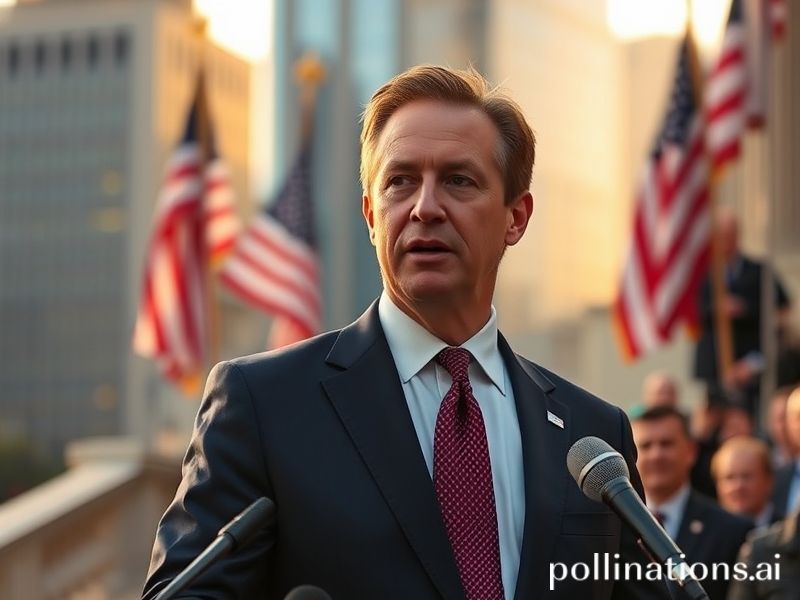Brad Lander: The Unlikely New Yorker Shaking Global Bond Markets Before Breakfast
Brad Lander and the Municipal Thermometer: Why One New York Comptroller Makes the Bond Markets Sweat from Singapore to São Paulo
By the time Brad Lander hops on his 7 a.m. Zoom with London pension managers, the overnight repo desks in Hong Kong have already priced in whatever he might say. That’s the quiet punchline of 2024: a man whose job description still reads “chief bookkeeper for the five boroughs” now moonlights as the world’s municipal-weathervane. When Lander sneezes—say, by threatening to withhold a $220 million subsidy for a Hudson Yards expansion—credit analysts in Zurich reflexively reach for tissues labeled “U.S. sub-sovereign risk.” The joke, if you like your humor dark and dripping with sovereign spreads, is that nobody elected any of those analysts. They simply noticed that New York’s general-obligation bonds sit in about 37 percent of global ESG-tilted funds, right next to Chilean solar farms and German Pfandbriefe. In other words, Lander’s spreadsheets have become a proxy for whether the planet still trusts American cities to pay their bar tabs.
The international press corps, never missing a chance to overstate the obvious, has started calling him “the Moodiest man in Manhattan,” a backhanded compliment that conflates the rating agency and his perpetual scowl at fiscal folly. Last month, when Lander released an audit arguing that New York’s flood-resilience bonds were financing what amounted to artisanal sandcastles, the Australian Broadcasting Corporation ran the headline “Comptroller Questions if NYC Building Ark or Just Very Expensive Beach Art.” Australians, having recently discovered the downside of selling coal to everyone else’s climate, enjoy that sort of irony with their morning flat whites.
Europeans, meanwhile, treat Lander like a living stress-test. Frankfurt’s risk committees parse his language the way Kremlinologists once parsed Pravda fonts. If Lander uses the word “restructuring” anywhere near the phrase “capital projects,” yields on New York’s green bonds widen by four basis points faster than you can say “Teutonic angst.” It’s a peculiar form of soft power: not aircraft carriers, but actuarial tables. The last time a city comptroller moved global markets this effortlessly, Chicago was on fire and Mrs. O’Leary’s cow was unavailable for comment.
Emerging-market treasury officials watch from the sidelines with the hollow amusement of people who have seen this movie before. When Lander lectures about “fiscal guardrails,” a deputy finance minister in Nairobi can be forgiven for suppressing a giggle; Kenya just rolled over a eurobond at 10.4 percent while New York borrows at 3.1. Still, the Nairobi official keeps a laminated photo of Lander on his wall—not for inspiration, but as a memento mori should global liquidity ever decide that American cities are just another frontier market with better bagels.
Even the Chinese financial press has joined the pile-on. The Global Times ran a think-piece titled “Lander’s Caution: A Warning for Over-Leveraged Metropolises Everywhere,” which roughly translates to “See, even the Americans can’t make infrastructure math work.” The irony, thick enough to spread on bilingual toast, is that Shanghai’s own local-government financing vehicles are rumored to be hiding enough off-balance-sheet liabilities to make the Big Apple look like a fruit stall. But that’s global finance: a hall of mirrors where everyone points at someone else’s distorted reflection.
So what does it all mean, beyond the usual circus of numbers masquerading as destiny? Simply this: in a world where cities now outrank half the UN’s member states in GDP, the municipal bean-counters have become minor deities. Lander’s spreadsheets may look boring, but they are the modern equivalent of entrails—examined by priests in far-off capitals for signs of whether the empire will hold another season. And if the entrails look dicey? Well, there’s always another city, another spreadsheet, another dark joke about human nature’s tendency to borrow today and pray for a bailout tomorrow.
In the end, Brad Lander is just a man who rides the subway to work and worries aloud about sewer upgrades. That global markets choose to parse his every sigh is less a testament to him than to the rest of us, who’ve somehow built a financial system so interconnected that one city’s comptroller can make a pension fund in Reykjavík reconsider the meaning of risk. The joke, dear reader, is on all of us—and the punchline compounds daily.







